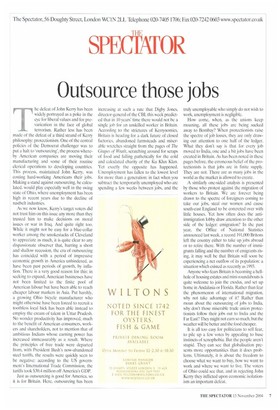Outsource those jobs
The defeat of John Kerry has been widely portrayed as a poke in the eye for liberal values and for prevarication in the face of global terrorism. Rather less has been made of the defeat of a third strand of Kerry philosophy: protectionism. One of the central policies of the Democrat challenger was to put a halt to 'outsourcing', the process whereby American companies are moving their manufacturing and some of their routine clerical operations to developing countries. This process, maintained John Kerry, was costing hard-working Americans their jobs. Making a stand against outsourcing, he calculated, would play especially well in the swing state of Ohio, where unemployment has been high in recent years due to the decline of rustbelt industries.
As we now know, Kerry's target voters did not trust him on this issue any more than they trusted him to make decisions on moral issues or war in Iraq. And quite right too. While it might not be easy for a blue-collar worker among the smokestacks of Cleveland to appreciate as much, it is quite clear to any dispassionate observer that, barring a short and shallow recession, the era of outsourcing has coincided with a period of impressive economic growth in America unhindered, as have been past periods of growth, by inflation. There is a very good reason for this: in seeking to expand, American businesses have not been limited to the finite pool of American labour but have been able to reach cheaper labour markets in Asia. Put harshly, a growing Ohio bicycle manufacturer who might otherwise have been forced to recruit a toothless local hick has been able instead to employ the cream of talent in Uttar Pradesh. No wonder productivity has improved, much to the benefit of American consumers, workers and shareholders, not to mention that of ambitious Indians whose earning power has increased immeasurably as a result. Where the principles of free trade were departed from, with President Bush's now-abandoned steel tariffs, the results were quickly seen to be negative: according to the US government's International Trade Commission, the tariffs took $30.4 million off America's GDP.
Just as outsourcing is good for America, so it is for Britain. Here, outsourcing has been increasing at such a rate that Digby Jones, director-general of the CBI, this week predicted that in 10 years' time there would not be a single job for an unskilled worker in Britain. According to the strictures of Kerrynomics, Britain is heading for a dark future of closed factories, abandoned farmsteads and miserable wretches straight from the pages of The Grapes of Wrath, scratching around for scraps of food and falling pathetically for the cold and calculated charity of the Ku Klux Klan. Yet exactly the opposite has happened. Unemployment has fallen to the lowest level for more than a generation: in fact when you subtract the temporarily unemployed who are spending a few weeks between jobs, and the truly unemployable who simply do not wish to work, unemployment is negligible.
How come, when, as the unions keep moaning, all these jobs are being sucked away to Bombay? When protectionists raise the spectre of job losses, they are only drawing our attention to one half of the ledger. What they don't say is that for every job moved to India, one and a bit jobs have been created in Britain. As has been noted in these pages before, the erroneous belief of the protectionists is that jobs are in finite supply. They are not. There are as many jobs in the world as the market is allowed to create.
A similarly one-sided analysis is presented by those who protest against the migration of workers to Britain. We are forever being drawn to the spectre of foreigners coming to take our jobs, steal our women and cause south-east England to be concreted over with little houses. Yet how often does the antiimmigration lobby draw attention to the other side of the ledger: emigration? In the past year, the Office of National Statistics announced last week, a record 191,000 Britons left the country either to take up jobs abroad or to retire there. With the number of immigrants falling and the number of emigrants rising, it may well be that Britain will soon be experiencing a net outflow of its population: a situation which existed as recently as 1993.
Anyone who fears Britain is becoming a hellhole of housing estates and mini-roundabouts is quite welcome to join the exodus, and set up home in Andalusia or Florida. Rather than fear the phenomenon of international migration, why not take advantage of it? Rather than moan about the outsourcing of jobs to India, why don't those miserable trade union protectionists follow their jobs out to India and the Far East? "They might not earn so much, but the weather will be better and the food cheaper.
It is all too easy for politicians to sell fear, to pile up a few votes by appealing to base instincts of xenophobia. But the people aren't stupid. They can see that globalisation presents more opportunities than it does problems. Ultimately, it is about the freedom to choose what we want to buy, how we want to work and where we want to live. The voters of Ohio could see that, and in rejecting John Kerry they inflicted upon economic isolationism an important defeat.


























































































 Previous page
Previous page